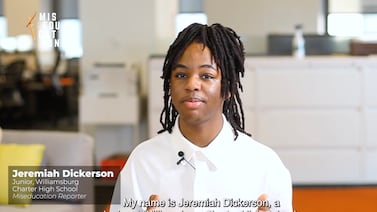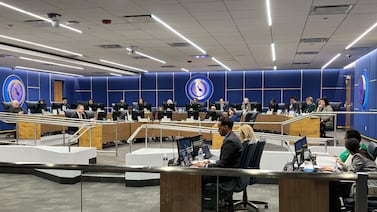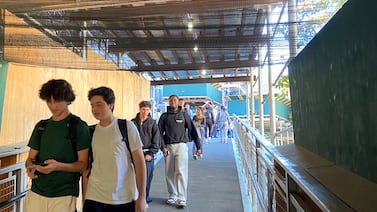This story was originally published on May 12by THE CITY. Sign up here to get the latest stories from THE CITY delivered to you each morning.
With voting underway in the election for United Federation of Teachers leadership, longtime president Michael Mulgrew is facing insurgent challenges at a time when workers broadly have been willing to jettison veteran leaders — most recently 1199 SEIU president George Gresham.
Mulgrew and two other candidates are seeking to head the second-largest public-sector union in the city, which represents not just the city’s teachers and other professional school staff but also hundreds of nurses in some private hospitals.
Whoever wins will have influence that extends far beyond the union’s nearly 200,000 members, including retirees. Under the weighted voting system of the city Municipal Labor Committee (MLC), the UFT wields influence on issues impacting all city government workers in New York, including in the ongoing battle over the attempted shift of retiree health coverage to Medicare Advantage.
The Medicare Advantage showdown — and Mulgrew’s role in helping concoct the cost-savings concept a decade ago in exchange for long-sought raises for city workers — is at the heart of this year’s election. Both opposition slates vow to preserve retirees’ current benefits and cancel the Medicare Advantage switch, and they’re pushing for greater transparency within the organization.
Mulgrew himself turned around and opposed the switch last year, amid fierce opposition from retirees. Retired workers are about a third of the union’s membership and have a vote in elections.
The Medicare Advantage reversal showed “a real vulnerability” in Mulgrew’s leadership, said Joshua Freeman, a labor historian and professor emeritus at Queens College. If the more militant wing of the union achieves an upset, “they would be quite a transformative force,” he said.
In an interview with THE CITY, Mulgrew defended his record of securing reduced class sizes, paid parental leave, and a collective bargaining agreement after former Mayor Michael Bloomberg refused to bargain with the UFT or any other unions during his final term. He struck that agreement with former Mayor Bill de Blasio in bargaining premised on the UFT and other unions cooperating in realizing billions of dollars in health care savings.
“Democracy should prevail at all times,” Mulgrew said of the election challenge. “My main thing right now is finishing up the state budget, moving then into the city budget, and also constantly dealing with all the attacks we get from the federal government.”
Leading the opposition is Sunset Park middle school art teacher Olivia Swisher, who is running on the ARISE — Alliance of Retired and In-Service Educators — slate, a reform platform focused on improving union democracy and preserving retirees and active members’ existing health care and benefits.
“Our current leadership feels more pressure to comply with the city than they do to members, and so we would flip that,” Swisher told THE CITY. “When we have a leadership that is just not interested in centering members, or listening to members, or even creating spaces for members to share what their lived experience is, they should be put on notice that members are then going to work together to try to unseat you.”
Also running on a reform slate is UFT representative Amy Arundell, who was reassigned from a Queens leadership position in 2023 soon after she posted criticism of Israel’s response to the Oct. 7 attacks by Hamas; her supporters say the transfer was an act of censorship. Arundell is running on the ABC (A Better Contract) caucus line.
“What we’re finding now is lots and lots of people are hungry for change in our union, because there has just been a stagnation of wages and a deterioration of working conditions and benefits,” Arundell said. “And in our profession and our membership there hasn’t been any advancement — and we basically have a leadership telling us, ‘you’re wrong.’ And people don’t accept that anymore.”
Mulgrew seeking a sixth term
Mulgrew has headed the union since 2009 and was re-elected to a fifth term in 2022, getting 66% of the vote — a commanding win but 20 points below his 2019 margin of victory and his lowest since taking office.
Two years later, an opposition group that campaigned on blocking the health care switch trounced the Mulgrew-backed Unity slate in retiree chapter elections for the first time in the chapter’s 40-year history. That same group endorsed Swisher and the rest of the ARISE slate, as did the Movement of Rank and File Educators, one of the UFT’s largest and most militant caucuses, which focuses on social justice issues.
Swisher is quick to point out that she is the only on-duty public school teacher vying for the presidency: “If you were not working in a school during COVID, in my opinion, you should not be running for UFT president — and that includes both of the people that I’m running against.”
But the ongoing saga over the fate of the Medicare Advantage switch is at the heart of this year’s elections. None of the candidates support the changeover, which is paused during a protracted court challenge. At the same time, none suggested how the UFT or other unions could alternatively achieve the billions in health care cost savings they committed to under past bargaining.
Mulgrew, in an interview with THE CITY on Thursday, said he regrets supporting the switchover for as long as he did.
“I regret the rollout and the information of that plan, and now, knowing where it actually ended and the anxiety it caused — we should face that, and we should have gotten out of it earlier,” he said.
Time is running out to come up with a solution. With the fate of the deal tied up in the courts, the health cost reserves it was meant to run has gone dry.
The MLC filed a lawsuit against the city last week related to the health care switch, exposing a long-simmering conflict between the unions and the city over which side is responsible for securing billions of dollars in health care savings. The city is seeking arbitration, demanding as much as $4 billion from the unions to make up for the missing savings. The unions argue that Mayor Eric Adams’ failure to deliver on the agreed-to Medicare Advantage transition is not their fault.
And in another twist, the MLC’s longtime leader, Harry Nespoli, recently announced that he is retiring, leaving the future of the plan in the hands of a yet-to-be-determined successor.
One thing all three candidates agree on is their contention that the unions should not be on the hook for billions of dollars in health care savings
“They’re full of crap,” Mulgrew said of the city.
Challengers call for more transparency
Also driving the renewed efforts to oust longtime leadership is the opposition’s desire for greater transparency and accountability within the union.
The union’s functional chapters — the groups representing different job titles, from paraprofessionals to occupational therapists, educators and retirees — should have greater latitude for their internal business and issues that affect them directly, Arundell said.
Swisher said she’d create an organizing department on day one, both to start the 2027 contract campaign but to empower the rank-and-file to have a say in major decisions, like Medicare Advantage or, in another major issue of the election, better pay for paraprofessionals. She also said she wants bargaining sessions to be public.
Both Arundell and Swisher described the health care savings agreement as emblematic of the back-room dealing within their organization that they would like to end, with Swisher pointing out the non-disclosure agreements that negotiating committee members are bound to as a condition for participating in contract talks.
“When we operate behind closed doors, we’re not only leaving out our members in the process, we’re also leaving out our greatest allies, which are the communities that we serve,” said Swisher.
“When the communities that we serve and our members don’t see how we are responded to by the Department of Education when we try to advocate for things like better heating and cooling in our schools so that kids don’t get nosebleeds, and they tell us, ‘No, we can’t do that’ — families need to hear what the DOE says no to us over and over and over again, so that we can put real political pressure on the mayor,” she added.
Freeman, the labor historian, noted that the UFT has long had dissident groups within the union, and younger members have a more militant bent fueled not only by national pro-union headwinds but local issues like Tier VI, a controversial retirement reform effort led by then-Gov. Andrew Cuomo that set lower standards for new hires.
In 2019, the union was among labor groups singled out in a widely circulated memo from the New York City chapter of the Democratic Socialists of America that called on the organization’s own members to become more active in their unions in order to advance causes of the left.
Mulgrew slammed what he described as the influence of an “outside group,” though many UFT members are also DSA members. In fact, there are DSA members running on all three slates on the ballot, said Ryan Bruckenthal, a special education teacher in Manhattan who is running for the union’s executive board on the ARISE slate.
“We each are slates or caucuses or factions of our larger organization, and we all believe in strengthening the UFT, and we all believe in protecting and expanding public education,” said Bruckenthal, who is also a DSA member. “At the end of the day, whoever wins on May 29, the important thing is that we continue to build the UFT in defense of public education and against the attacks coming from the Trump administration.”
The city’s largest public sector union, District Council 37, is also experiencing a revolt among its ranks on issues of internal democracy. Dissident members of Local 3005, which represents health department scientists and researchers, are vying to unseat incumbent leadership in that local’s elections later this month.
The thirst for greater militancy from young union members can’t be divorced from the forces that have reinvigorated the labor movement in recent years, Freeman said, though he noted that the three-way race could help Mulgrew prevail in the end.
Ballots were sent out to eligible dues-paying members on May Day, and ballots must be returned no later than May 28, to be counted at the UFT headquarters on May 29.
More than a dozen union leadership and delegate positions at the city’s second-largest union are on the line, and the winners will start their three-year terms on July 1.





